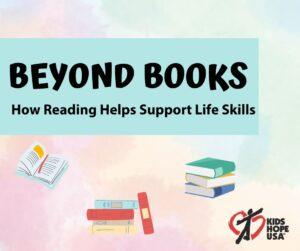
Imagine about halfway through your Kids Hope USA mentoring hour, your student heads over to the library shelves. She pulls out a few, looks at the covers, considers reading them, and shoves them back. She finds another shelf and pulls out a couple of books that you have read together too many times to count.
Reading may be your student’s favorite activity. Or it may require some encouragement and nudging to get them to read a page. In either case, spending time during your mentoring hour to read can be both a fun and valuable learning time for your student.
In our blog article, “Beyond Books & Games: How Simple Mentoring Activities Strengthen Valuable Life Skills”, we shared how seemingly simple mentoring activities, such as reading, actually pave the way for significant growth in valuable life skills.
Here, we’ll dive deeper into how the activity of reading can help support important life skills for your student.
SIX WAYS READING SUPPORTS LIFE SKILLS
The activity of reading can help a student’s literacy and language. And it can also help your student develop soft skills as they persevere through each page. Check out this list of six ways reading can help your student build valuable skills.
Improves Literacy & Comprehension
Perhaps the most obvious, practicing reading helps your student become a better reader. By encountering new books and stories, and coming across some new words, they’ll grow their language knowledge and ability to move across the page. Practicing page by page can help them move through words and sentences quicker as they gain more experience in reading.
Asking questions about what’s happening in the story can also reinforce their comprehension of what they’ve just read.
Strengthens Confidence
Particularly if your student has had to put in extra effort for reading, they may also struggle with their confidence in being able to read well. Reading together during your mentoring time can encourage them and strengthen their confidence in themselves. By praising their efforts, they can learn that they are capable of reading well. Your encouragement and support as a mentor can make a tremendous difference in boosting their reading confidence.
Builds Perseverance
Imagine while reading with your student, she continually gets stuck on –ing words. Even when taking the time to sound out each syllable, she struggles to put the pieces together to sound out the right word. In this, she – and you as her mentor – can either give up on the book or persevere to get the right word.
With your encouragement, your student can learn to not give up when she can’t figure out the word or sentence immediately. She’ll strengthen her perseverance to keep working, sounding out each letter, and looking at the context to determine the right word. Letting your student work her way through a challenging sentence can empower her to build resilience and confidence that she can do difficult things.
Encourages Focus
Especially as a student is learning how to read and strengthening their skills, they require a lot of brain power to get through a page. That’s why reading can also enforce the importance of focus when reading. To go through page by page requires them to not worry about what another student at the other table is doing but to zero in and focus on the task at hand.
Teaches Empathy & Creativity
While there are benefits from the actual practice of reading, there’s also opportunity for growth through the stories that are read. Books that highlight social-emotional skills, such as empathy and managing emotions, can be a great opportunity for your student to learn and for you two to discuss what showing empathy or being kind to a friend looks like.
The storyline or setting of a book can also encourage your student to think outside of the box and be creative. You can also ask your student other questions about the story or characters to spark their own creativity, such as asking what the character is feeling in that scene.
Reading Strengthens Your Relationship
Just as with the card games, coloring pages, and other activities you do with your student during the mentoring hour, reading also can help build your relationship. Dr. Emilie DeYoung from Winning At Home says that “a way for you to fill your student’s love tank is sitting with them and reading a book.”
As you spend time together, there are also many ways that you can make reading even more fun. Pick a funny voice to read in. Make a summary of the story when you’ve completed it. Mentors and directors can access their Kids Hope USA portal to find even more great ideas to liven up your reading time with your student.
STRENGTHEN SKILLS WITH READING
Like a game of Uno or a 500-piece puzzle, the activity of reading serves a far greater purpose than taking up time during a mentoring hour. Taking time to read a story supports both your student’s academic skills and social-emotional skills, too.
Want to learn more about mentoring through a Kids Hope USA program? Check out our program page!
